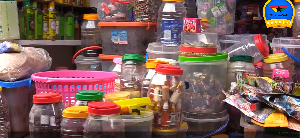In light of the rapid expansion of the global market for electronic goods, the lifespan of many electronic goods continue to shorten. Consequently, there has been a rapid growth in electronic waste (e-waste). There is no end in sight, as with each passing day what were once new technologies are made obsolete. The United Nations estimates 20-50 million tons of e-waste is generated globally each year. Although some exported used electronics can be refurbished and recycled in countries with effective regulatory systems and industries, a large quantity ends up in countries where the electronics are handled and disposed of in ways that threaten health and the environment. E-waste often ends up in countries with little or no regulations on recycling and disposal of such goods. Asia has, historically, been the dumping site for e-waste, but the focus is now shifting to West Africa, especially, Ghana. This brief calls for policy change on the part of the United States, the leading producer of e-waste. But who am I kidding, here? My grandmother used to say, if a mentally challenged person is throwing stones into your room through your window, and you refuse to close your window, perhaps you are the mentally challenged one. To that effect, this brief also calls for the adoption of comprehensive regulations and guidelines by the Ghanaian government concerning the importation and handling of used electronic goods.
A firm understanding of the root causes of the problem with e-waste is essential to coming up with comprehensive solutions. Globally, the United States is the leading producer of e-waste. Each year Americans upgrade their cell phones, personal computers, televisions and other electronic devices at an alarming pace. In 2006 alone, Americans removed over 300 million electronic devices from their homes; about 80 percent of these products end up in landfills in the United States, while the other 20 percent are exported for reuse or recycling. Twenty percent of 300 million is a significant quantity, and with the 2009 switch to digital television, Americans are expected to dispose of even more e-waste. The practice of exporting “functional” second hand computers and other electronic devices from the US to Africa is often seen as bridging the “digital divide” because these old computers can be purchased for less than 1/10th the cost of a new one. However, because the US Environmental Protection Agency (EPA) lacks strong regulations on the export of “functional” second hand electronics, and because the Ghanaian government has virtually no enforceable regulations and guidelines on the importation of reusable second hand electronics, as much as 75 percent of these second hand electronics cannot be reused and end up in landfills in Ghana, where children, mostly boys between the ages of 11-18 take apart the electronic scrap, often with their bare hands and a stone to extract metal parts, mostly aluminum and copper. Since there is a growing demand for these metals and some plastics, (copper is sold at US$0.22 per half kilo, and plastic at US$0.01 per kilo) the children extract and sell the metals and plastics, to make a living, risking their health and ultimately their lives.
The Current US and Ghanaian Policy and Areas of Needed Change
The Basel Convention is an UN-backed accord passed in 1989 to regulate the flow of hazardous waste from industrialized nations (members of the Organization for Economic Co-operation and Development) to developing ones for disposal. The Basel Convention states that a country may ship hazardous waste only after it receives written consent from the receiving country. The 1995 amendment to the treaty bans the exportation of e-waste form rich to poor nations. One hundred and seventy (170) nations—including virtually every developed nation—have ratified the accord (including 140 developing countries). However, the United States has not.
Although not a ratifying member of the Basel Convention, the United States is a member of the OECD, and has agreed to abide by OECD Council decisions. In 2001, OECD Council changed its waste classifications, including which products are considered hazardous wastes. These changes agree with those of the Basel Convention, although the 2001 decision does not require changes to the scope of what is classified as hazardous wastes by the United States. The OECD Council requires of the classification system to facilitate coordination among the counties involved in the transboundary transport. Despite agreeing to abide by the OECD decision, the United States has yet to implement it.
Cathode Ray Tubes (CRTs) are the only electronic device classified as hazardous e-waste and whose export is particularly regulated by the US EPA. CRTs contain copper and lead which are harmful to people and the environment. The US EPA requires the exporter of CRTs to notify the EPA of its intention, and to obtain consent from the importing country for shipment. This in essence puts the onus on the importing country to have the right systems in place to ensure the timely and lawful authorization of all electronic goods it allows into its ports.
Ghana, the importing country, lacks the capacity and personnel for effective and efficient control of e-waste disposal. There are no comprehensive mechanisms in place to regulate the importation, storage, transportation, and disposal of used electronic goods and e-waste. The Basel Convention is an international treaty, and will require an act by the US Congress and the President for ratification. Instead of waiting for the US to change and implement its policies, viz., ratify the Basel Convention, the Ghanaian government must take the initiative. In other words, it should do something about the window, through which the stones are being thrown. Although logistically challenging, the Ghanaian government on the receiving end ought to identify a timetable to develop and implement a systematic and comprehensive set of domestic regulations on the importation of electronic goods. These regulations should include the essential elements of effective enforcement, such as enforcement targets, monitoring, follow-up of suspected violations, and tough prosecution of violators. Although these new and tough regulations may slow down the legitimate importation of reusable second hand electronics and may drive up the cost of these goods to the local consumer, it is a fair price to pay to protect the health of humans and the environment. It will also be a firm indication by the Ghanaian government to the developed world that Ghana is no longer willing to be a dumping ground for world’s hazardous electronic waste.
Richmond Darko MD/MPH candidate
University of Chicago Pritzker School of Medicine
Emory University Rollins School of Public Health
Opinions of Wednesday, 25 August 2010
Columnist: Darko, Richmond












